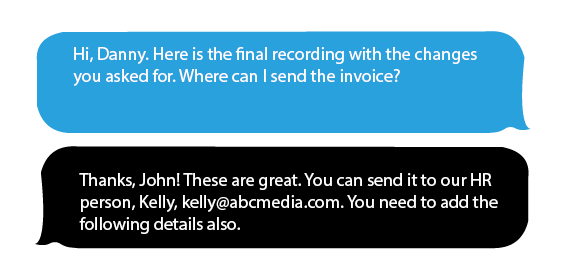
How CRM companies help voice actors improve client relations
In this piece, we’ll show you how CRM companies can be a helpful tool to improve client relations and continue building relationships with clients. And we’ve secured special discounts!
Can you remember what you ate for breakfast last Thursday? Or how many times you checked your cell phone yesterday? The odds are that you probably can’t. And that’s okay because you don’t need to remember what you eat for breakfast. But you do need to remember your interactions with your clients to improve client relations.
What does the CRM acronym stand for?
The CRM acronym stands for Customer Relationship Management. According to Hubspot, the CRM acronym can be defined as ‘a system for managing relationships with your customers.’
As a result, instead of relying on your memory, excel sheets, or notebooks, a customer relationship manager is web-based and designed to help you record and track client information.
How CRM companies can help you
One of the best ways to create a successful and permanent voice over business is by building relationships with clients. This can be done through a CRM. And most CRM companies do have tutorials and support to help you learn how to build client relationships.
So, it doesn’t have to be long and complicated or even time-consuming. In fact, once you learn how to build client relationships with your CRM, you will save time, money, and resources. You will also see a marked improvement in your client relations. This is because it’s easier to keep track of whom you’re speaking to, which projects you’re working on, your rates for each project, and your payment statuses.
How can CRM companies help you to maintain contact and client relations?
Building and improving client relations will not happen overnight. It takes time to gather and track information, and build rapport. But once you’ve obtained the information, you don’t have to worry about remembering or storing it.
Let’s take a look at a practical example.
John is a voice actor, just hired by ABC media. Here’s their abridged conversation.

After the session, John needs to get paid. So he messages Danny.

How would a CRM benefit John in this case? He could take this information, create a client profile and set it up like this.

So the next time Danny reaches out, John will know exactly which project he worked on before, what rates he charged, whom to invoice, and whether he was paid for the last job or not.
Tracking auditions and invoices
Your CRM dashboard will help you to track auditions, bookings, payments, and even client interactions from online casting platforms. And when you’re trying to learn how to build client relationships, CRM companies can offer detailed advice and suggestions that are tailored to your voice over business. This is also important when you’re trying to build your brand.
Voice123’s Customer Success team also deals with commonly asked questions that you might be wondering yourself:
-Can you help me check if I was paid for this booking?
-I received this message but I don’t know which client booked me.
-I auditioned for this project but now the rate has changed and I don’t remember what the original amount was.

Deb DeVries, a voice actor on Voice123 notes how a CRM helps her voice over business and improving client relations:
“It helps me stay on top of my invoicing … I just realized I still have an outstanding invoice and it was a net 30. Without that prompt or that reminder that might’ve gone by the by … You can track your audition to booking ratio. You can look at a whole span of time, say a year and say, okay, what are some of my trends revenue wise, or what are some of my trends for auditions?”
Do's and Don'ts on building relationships with clients
Your CRM can become a sort of voice over manager. Consequently, it can help you to avoid unnecessary interactions with your clients, asking redundant questions, and mixing up information. Or it can become a source of spam communication that puts a client off. It’s like a baseball bat. It can score a homerun and win the game, or break a window and land you in trouble! It all depends on how it’s used.
You are everything from the marketer to the accountant, talent, editor and all of the things that comprise that voiceover business. - @DaniStatesVO Share on X – Dani States, Founder of VOICEOVERVIEW and a voice actor on Voice123
Dani States built VOICEOVERVIEW because she needed a place to stay organized, but none of the existing tools were doing it for her.
“It’s a full-on business management system. You can track your jobs from the time that you book it to when you deliver, get approval, invoice and actually pay.”
Dani’s helpful CRM Do’s and Don’ts:
Do “make your CRM part of your daily workflow, especially when you’re brand new.”
Do “put the people in that you’re actively in conversation with, people that are actively looking to hire but not those people that someday I might reach out to. Keep that in a separate area”.
Don’t “make it something that you have to catch up on at the end of the day or month because it will soon become overwhelming.”
Don’t “add every contact you’ve ever made contact with.”
Exclusive deals from CRM companies
You’ve got the most popular CRMS designed for various industries such as Nimble, Hubspot, and Salesforce. Or something specifically designed to be a voice over manager for voice actors. This can also help you learn how to build client relationships in the voice over industry. Some like UpperLevel hosting offer a CRM and website hosting for voice actors.
In fact, Deb also mentions that she uses a voice over CRM because “it is highly customized for our particular industry. There are some fine CRMs but they don’t use terminology like audition, booking percentage … all of those descriptors are relatively unique to the voiceover industry. It gave me a tool that provided me the opportunity to put all of my customer information in a single place.”
To help boost your voice over business, Voice123 has partnered with the following voice over CRM companies. Learn more about them here:

Created by Dani States, VOICEOVERVIEW is a voiceover-specific business tracking and management platform with a CRM component. Unlike traditional CRMs (Nimble, Zoho, Constant Contact, etc), they focus on the core competency, which is the unique business metrics of voiceover. This is a platform will help you understand your business better AND helps you keep track of clients.

Spearheaded by Brad Newman, UpperLevel CRM is a uniquely designed platform created and inspired by the voiceover community, fully understanding your needs and the journey required to be your best.

Jason McCoy created SpitFire CRM after realizing his time was best spent in front of a microphone rather than following up on invoices.
“I was using a CRM to keep track of business relationships and an invoicing app to bill clients. SpitFire puts everything in one place so I save time running my business.”
See below for special deals from these CRM companies!

Voiceoverview
Sign up via this link and receive a 3 month free trial.

Spitfire CRM
Sign up & get a 14-day free trial by using the coupon code VOICE123 to save $5 per month off the monthly plan.

UpperLevel CRM
After signing up and verifying your email, put Voice123 anywhere on the form to redeem a free 6 month trial.
Boost your voice over work opportunites with a paid Voice123 membership
First-time paying members are eligible for a discount
Share this post!
A blog owner yourself? Relevant links to quality sites will help your performance on search engines. If your readers will benefit from the services or information on The Booth's Voice over Guide, please consider linking to this post or the guide itself.


